Mango is an excellent fruit for beauty and weight loss regimens due to its abundant nutritional content. Today, we will answer the question, “How many calories are in a mango, and will eating mangoes make me fat?”
How Many Calories Are in a Mango?
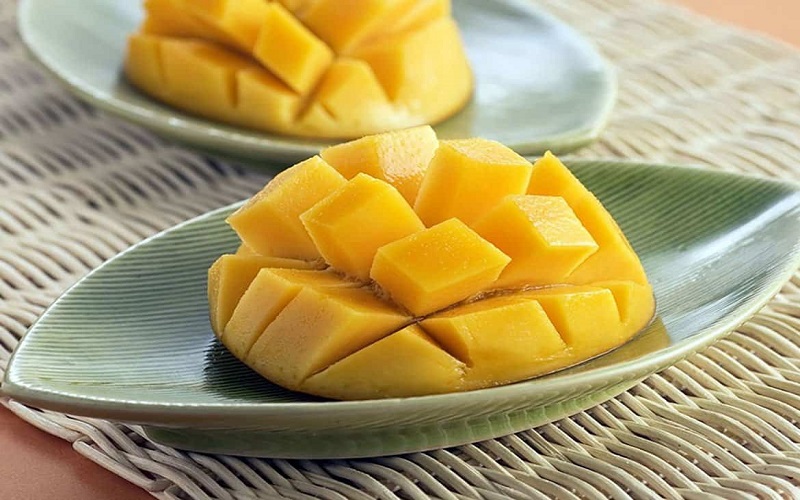 A 100g mango typically contains about 60 calories.
A 100g mango typically contains about 60 calories.
Mangoes are sweet and fragrant when ripe, and they pack a nutritional punch. According to research, a 100g ripe mango contains approximately 60 calories, depending on the mango’s weight and ripeness.
In addition to providing the necessary calories, mangoes are an excellent source of vitamins for the body.
Green mangoes have a significantly higher vitamin C content than ripe mangoes. Moreover, green mangoes provide 50 calories per 100g. So, if you’re looking to lose weight, green mangoes are a smart choice.
Will Eating Mangoes Make Me Fat?
 Eating a moderate amount of mangoes will not make you fat; in fact, it can help with weight loss.
Eating a moderate amount of mangoes will not make you fat; in fact, it can help with weight loss.
The answer to the question, “Will eating mangoes make me fat?” is no. In fact, if consumed in moderation, mangoes can aid in fat reduction.
Mangoes help with weight loss due to their sour taste, which contains organic acids. Additionally, mangoes are rich in essential vitamins for the body, including:
Consuming mangoes helps regulate and control excess fat, thereby aiding in weight loss. This makes mangoes an excellent choice for those trying to shed some pounds.
Moreover, the fiber in mangoes provides a prolonged feeling of fullness. The remaining nutrients in mangoes can also regulate insulin and leptin, breaking down fatty acids and stored fat in the body, thus reducing excess fat.
What Are the Health Benefits of Mangoes?
Nutritious and Helps Stabilize Blood Pressure
 Both ripe and unripe mangoes are packed with nutrients.
Both ripe and unripe mangoes are packed with nutrients.
Mangoes offer a wide range of nutrients, especially vitamins. Just one delicious mango smoothie provides you with 100 calories!
Another reason why mangoes can aid in weight loss is that they help reduce bad cholesterol levels in the body and balance potassium levels, thereby helping to stabilize blood pressure.
Cancer Prevention
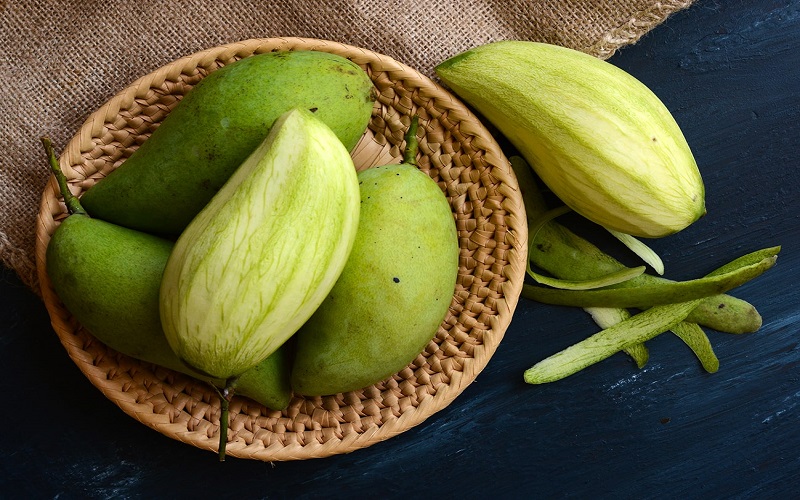 Mangoes help prevent certain types of cancer.
Mangoes help prevent certain types of cancer.
Scientists have confirmed that mangoes contain compounds such as gallic acid, isoquercitrin, quercetin, and fissetin. These are antioxidants that help prevent cancer effectively.
Cleanses the Skin and Improves Digestion
Eating mangoes will give you beautiful, clean skin, as mangoes contain an enzyme that helps convert protein and reduces stomach acidity. Therefore, those suffering from constipation, diarrhea, or dysentery should eat mangoes to aid in recovery.
Beneficial for Eye Health
 Vitamin A in mangoes is excellent for eye health.
Vitamin A in mangoes is excellent for eye health.
Thanks to the vitamins in mangoes, especially vitamin A, mangoes are great for eye health. Preparing mango-based drinks can help reduce eye problems such as dry eyes and soften the cornea. Moreover, the Zeathanthin in mangoes helps prevent age-related macular degeneration.
Weight Loss Recipes Using Mangoes
Mangoes can be used in various dishes, aiding in weight loss while also being delicious.
Mango Salad
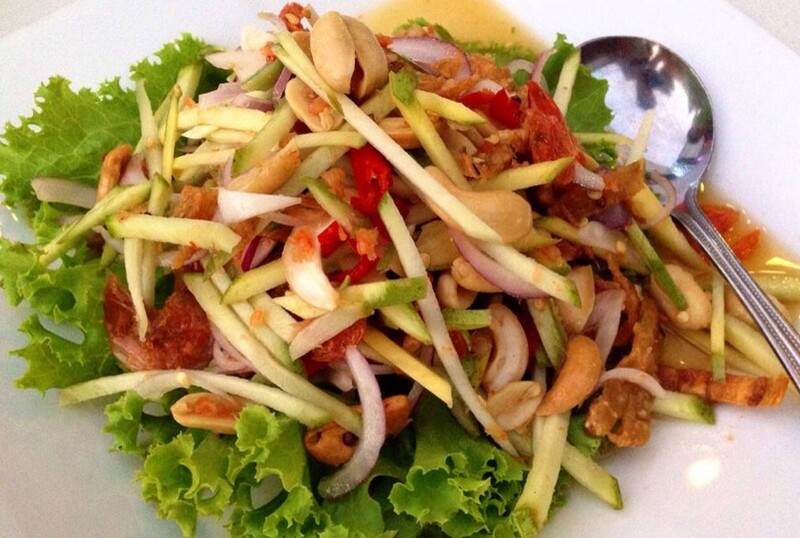 Mango salad is a delicious and healthy option for weight loss.
Mango salad is a delicious and healthy option for weight loss.
You can make a salad using green mangoes, pork ears, and herbs. This dish not only helps with weight loss but is also extremely tasty. However, when making this salad, avoid adding too much pork ear, and do not consume it when overly hungry, as it may upset your stomach. It is best to eat this salad for lunch.
Green Mango Stir-Fry
 Green mango stir-fry is a nutritious and low-calorie dish.
Green mango stir-fry is a nutritious and low-calorie dish.
Stir-frying a small amount of green mangoes with dried beef creates a fantastic flavor. This dish provides sufficient nutrients while being low in lipids, making it ideal for weight loss. You can eat this dish in the afternoon or 30 minutes after dinner.
Mango Smoothie
 Mango smoothies are nutritious and filling.
Mango smoothies are nutritious and filling.
Mango smoothies have a wonderful flavor and are very nutritious. You can add a little unsweetened milk to enhance the taste. This drink is very nutritious and doesn’t fill you up, making it perfect for weight loss. Drink mango smoothies after lunch or in the afternoon.
Mango Juice
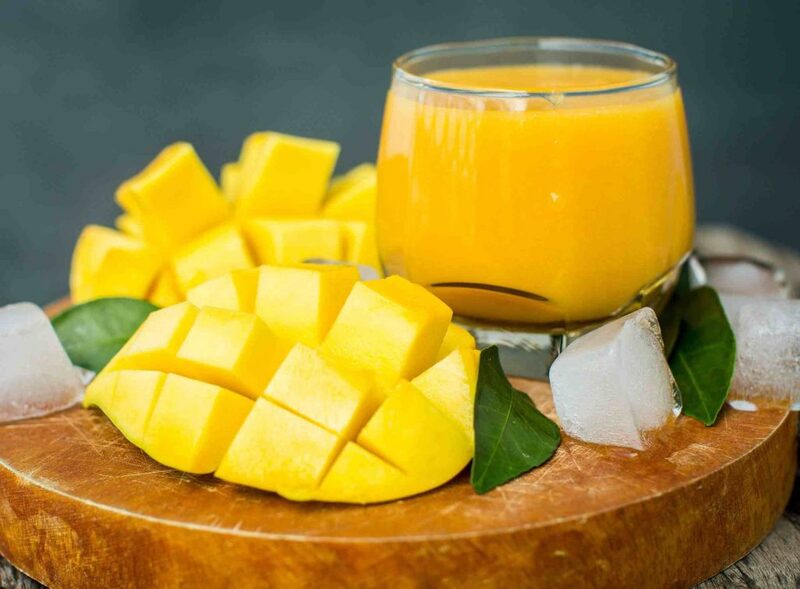 Mango juice is a refreshing and healthy drink.
Mango juice is a refreshing and healthy drink.
Mango juice is an excellent way to get your daily dose of vitamins and stay hydrated. It’s also a fantastic summer beverage during hot weather.
Important Notes When Using Mangoes for Weight Loss
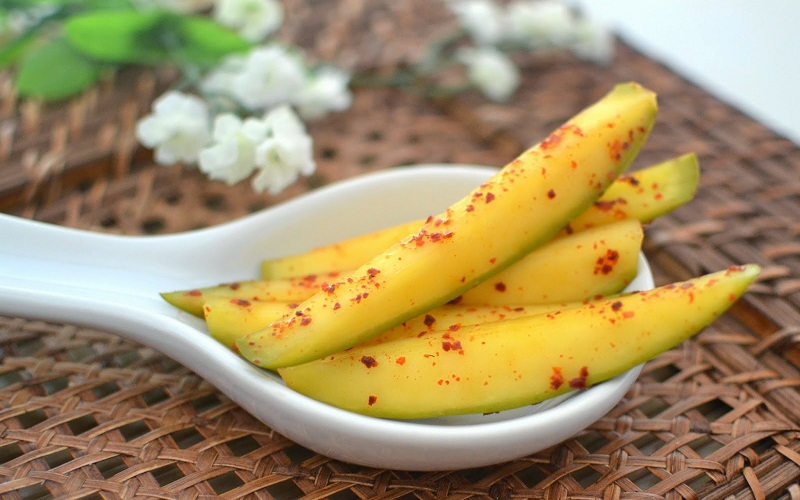 Some important considerations when using mangoes for weight loss.
Some important considerations when using mangoes for weight loss.
-
Avoid eating mangoes in the morning, whether ripe or unripe. It is best to consume them during lunch or in the afternoon, and not too close to bedtime. Remember not to eat or drink mango juice on an empty stomach.
-
Those with stomach issues should limit their intake of green mangoes due to their natural sourness.
-
When using mangoes for weight loss, combine them with exercise to enhance the effectiveness.
-
Do not eat too many mangoes, as the sugar in mangoes can stimulate skin bacteria, leading to acne. Those allergic to mangoes should also limit their consumption.
This article has provided a comprehensive overview of mangoes, answering the question, “How many calories are in a mango, and will eating mangoes make me fat?” Now that you know the amazing benefits of mangoes, incorporate them into your weight loss journey. Best of luck with your fitness goals!

































